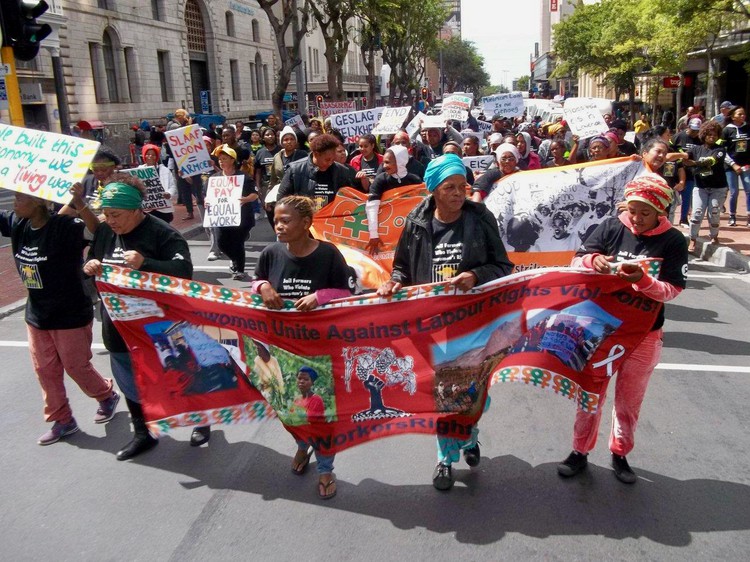Women farm workers demand end to labour abuses
Lack of enforcement of the law has lead to widespread violation of the rights of women farm workers, says NGO
Women farm workers marched in Cape Town on Friday to hand over a memorandum to the Western Cape Department of Agriculture and the Western Cape Department of Labour.
Women on Farms Project (WFP) organised the march which drew workers from Kraaifontein, Stellenbosch, Klapmuts, Worcester, De Doorns and other places.
Singing, “We are women. We want a living wage”, they carried placards reading: “Farm workers = backbone of the economy” and “Boere se profit = ons pyn” (Farmers’ profits equals our pain).
Colette Solomon, director of the Women on Farms Project, said: “Farm women’s conditions are becoming more insecure and precarious … After the introduction of the minimum national wage, farmers are reducing working hours and increasing dismissals … Now that there are discussions around land expropriation without compensation, they have increased worker evictions.”
The memorandum states: “While post-apartheid labour legislation is largely progressive and aimed at protecting the rights of farm workers, labour violations are an everyday reality on farms.”
“Despite legislation, seasonal women farm workers are generally excluded from legal entitlements (eg. maternity leave). Farmers are not paying women for working overtime,” it states.
The memorandum said that the Department of Labour is not doing enough to enforce labour laws and protect women farm workers, who “do not know their rights”.
In its memo, WPF says it deals on a daily basis with reports of farmers contravening labour laws, not paying the minimum wage, dismissing workers unfairly, and exposing them to injury while on duty.
“Such cases are always reported to the Department of Labour” but officials “do not follow up at all or take action against these farmers,” it says.
The memo says the Department of Agriculture has “no comprehensive strategy” to better working conditions for farm workers; it “appears to only represent farmers, and not farm workers”.
According to WFP, it met former MEC for Agriculture and Economic Affairs Alan Winde in 2017 and 2018. Winde asked for “specific cases and farms” at the meeting. But after the investigation, “workers on these farms reported that nothing had improved” and “some conditions had in fact worsened”.
WFP wants the agriculture department to draw up and publish a “blacklist” of those who violate rights of farm workers and the labour department to “prosecute farmers who violate labour laws”.
It wants a “quarterly multi-stakeholder labour forum” set up to devise ways to “advance the position of farm workers”, and to include farmers, NGOs, trade unions, and the departments of labour and agriculture.
Former farm worker Linda Norman, now 64, said she joined the march for the sake of her nieces, nephews, aunts, uncles and cousins who work on various farms in Koue Bokkeveld. “My relatives are too scared of their bosses to join the march and speak out against shabby treatment meted out to them on farms,” she said. “The [work] targets set are way too much for farm workers,” she said. “If a doctor tells you to stop working because you are too sick, the farm owners evicts you.”
Norman said there was no retirement plan for farm workers. “We want government to give farm workers UIF for three or four years [not only three months] after they have left their jobs,” said Norman.
Former farm worker Magrieda Prince said she had worked on farms for 23 years, but she has nothing to show for it. “I don’t have a cent in my bank account because the wage we get is too little”.
She now grows vegetables on a small plot to support her six children.
“I struggled to work because of my back operation, but the bosses said I must work or leave the farm,” she said.
Jessica Leetse said she has been a general worker on farms for 12 years and earns a monthly salary of R3,200.
“After we work overtime, the boss says we are making up for the time we wasted while smoking or relieving ourselves in the loo,” she said.
She has no working tap or toilet inside her house. She pays R400 for rent for herself and R200 for her two sisters, who visit her at weekends and on holidays. They are studying at the Cape Peninsula University of Technology.
Chief of Staff at the provincial agriculture department, Vuyolwethu Njalo, received the memorandum. She said she was “saddened to hear the stories” and promised to raise the farm workers’ issues with Minister Beverley Schafer.
Desmond Brown, an inspector at the provincial labour department said he would hand the memorandum to David Esau, who is a the chief inspector.
The MEC for Agriculture’s spokesperson was unable to comment by the time this article was published.
© 2019 GroundUp.
This article is licensed under a Creative Commons Attribution-NoDerivatives 4.0 International License.
You may republish this article, so long as you credit the authors and GroundUp, and do not change the text. Please include a link back to the original article.



